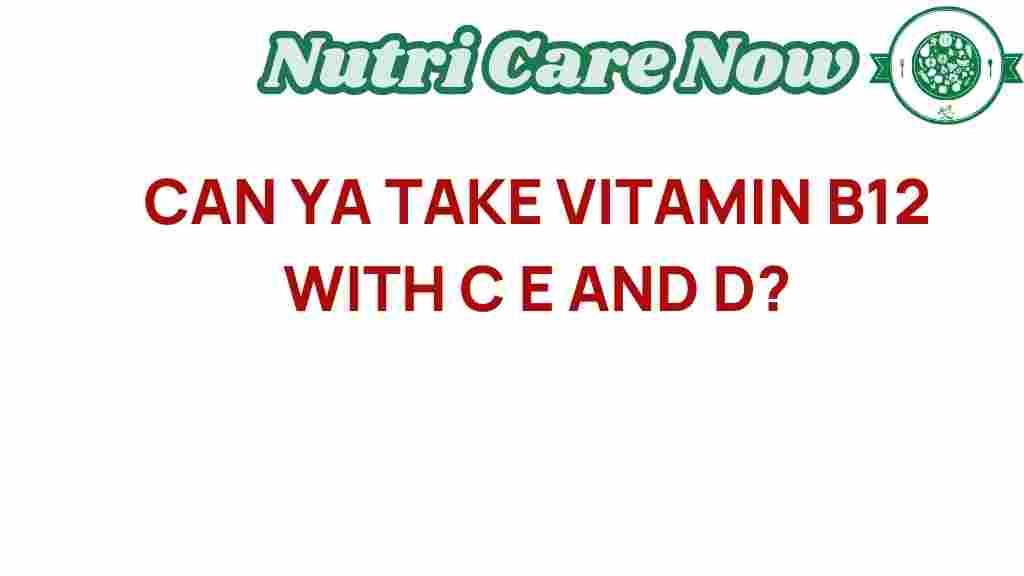Unlocking the Synergy: Can You Take Vitamin B12 with C and D?
In the quest for optimal health, the role of vitamins cannot be overstated. Among these, Vitamin B12, Vitamin C, and Vitamin D stand out due to their numerous health benefits and importance in maintaining overall wellness. But can you take these vitamins together? In this article, we will explore the synergy between these essential nutrients, their individual benefits, how they interact, and dietary advice to maximize their effects.
Understanding Vitamins B12, C, and D
Before diving into whether you can take Vitamin B12 with C and D, it’s crucial to understand what these vitamins do individually.
- Vitamin B12: This water-soluble vitamin is vital for nerve function, DNA production, and the formation of red blood cells. It is primarily found in animal products, making it essential for vegetarians and vegans to consider supplementation.
- Vitamin C: Known for its immune-supporting properties, Vitamin C is an antioxidant that helps protect cells from damage. It is also crucial for collagen production, aiding in skin health and wound healing.
- Vitamin D: Often referred to as the “sunshine vitamin,” Vitamin D is essential for calcium absorption, bone health, and immune function. It can be obtained through sunlight exposure, certain foods, and supplements.
The Health Benefits of Taking Vitamin B12, C, and D Together
Combining these vitamins can enhance their individual health benefits and improve nutrient absorption. Here’s how:
- Immune Support: Vitamin C boosts the immune system, while Vitamin D plays a crucial role in modulating immune responses. Together, they can provide a robust defense against infections.
- Energy Production: Vitamin B12 is known for its energy-boosting properties. When combined with Vitamin C, it may help reduce fatigue and improve vitality.
- Bone Health: Vitamin D enhances calcium absorption, which is essential for bone strength, while Vitamin B12 supports the health of bones indirectly by preventing osteoporosis.
- Improved Mood: A deficiency in Vitamin D and Vitamin B12 has been linked to mood disorders. Together, they may help in maintaining a positive outlook.
Can You Take Vitamin B12 with C and D? The Science Behind It
The good news is that Vitamin B12 can be taken with Vitamin C and Vitamin D without any adverse interactions. In fact, studies suggest that these vitamins can work synergistically to enhance overall health.
Here’s a step-by-step explanation of how they can be taken together:
- Assess Your Dietary Needs: Start by evaluating your diet. If you consume a balanced diet rich in fruits, vegetables, and proteins, your need for supplementation might be lower.
- Choose Quality Supplements: When selecting supplements, opt for high-quality brands that provide the recommended daily allowances of each vitamin.
- Consult a Healthcare Professional: Always consult with a healthcare provider before starting any new supplements, especially if you have underlying health conditions or are pregnant.
- Follow Recommended Dosages: Adhere to the recommended dosages for each vitamin. For adults, the typical recommended daily allowance is 2.4 micrograms of Vitamin B12, 90 mg of Vitamin C, and 600 to 800 IU of Vitamin D.
- Monitor Your Body’s Response: After starting the supplementation, pay attention to how your body responds. Look out for any side effects or improvements in your health.
Dietary Sources of Vitamins B12, C, and D
While supplements can be beneficial, obtaining vitamins through food is often the best approach. Here are some dietary sources:
- Vitamin B12: Found in meat, fish, eggs, and dairy products. Fortified cereals and plant-based milk are good options for vegans.
- Vitamin C: Abundant in citrus fruits, strawberries, bell peppers, broccoli, and tomatoes.
- Vitamin D: Fatty fish (like salmon and mackerel), fortified dairy products, and exposure to sunlight.
Potential Troubleshooting Tips
While the combination of these vitamins is generally safe, some individuals may experience issues. Here are some troubleshooting tips:
- Digestive Issues: If you experience nausea or digestive discomfort, try taking your supplements with food.
- Allergic Reactions: Monitor for any allergic reactions, particularly with Vitamin B12 injections, which can sometimes cause an allergic response.
- Interactions with Medications: Some medications can interfere with the absorption of these vitamins. Always discuss with your healthcare provider if you are on other medications.
Conclusion: The Path to Enhanced Wellness
In summary, taking Vitamin B12 with C and D can not only be safe but may also unlock a host of health benefits. From immune support and energy production to improved mood and bone health, the synergy of these vitamins is clear.
Incorporating these vitamins into your daily regimen, whether through diet or supplements, can significantly contribute to your overall wellness. Remember to always consult with a healthcare professional for personalized dietary advice and to monitor your health as you adjust your vitamin intake.
For more information on vitamins and their benefits, you can visit this external resource. And for further dietary advice, check our article on healthy eating habits.
This article is in the category Supplements and created by NutriCareNow Team
